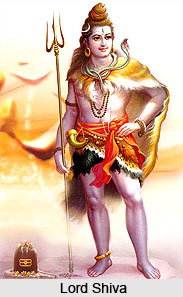Pushpadanta was one of Shiva`s principal attendants. Lord Shiva used to reside on the peak of Kailash, attended by innumerable spirits and genii, and worshipped even by the superior divinities.
 Parvati was the daughter of the mountain monarch, and the spouse of Mahadeva. She propitiated her lord by her celestial strains. Shiva was pleased by her adulations and he proffered her whatever boon she might request. Her only demand was to receive instruction from his lips, and to hear from him such narrations as were yet unknown to the immortals or herself. Shiva, giving orders that no person should be admitted, proceeded to reveal to the goddess those narratives which illustrate the happiness of the gods, the troubles of mankind, and the intermediate and varying conditions of the spirits of earth and heaven.
Parvati was the daughter of the mountain monarch, and the spouse of Mahadeva. She propitiated her lord by her celestial strains. Shiva was pleased by her adulations and he proffered her whatever boon she might request. Her only demand was to receive instruction from his lips, and to hear from him such narrations as were yet unknown to the immortals or herself. Shiva, giving orders that no person should be admitted, proceeded to reveal to the goddess those narratives which illustrate the happiness of the gods, the troubles of mankind, and the intermediate and varying conditions of the spirits of earth and heaven.
Pushpadanta came to the palace gate and was refused admission by the warder. He was a great favourite with his master, lord Shiva and had always-ready access to his person. The rejection excited Pushpadanta astonishment and curiosity; and, rendering himself invisible, he passed in, determined to ascertain why entrance was so rigorously barred.
In this manner he came close to the place where lord Shiva and Bhavani or Parvati were seated. He over-heard all the marvelous stories repeated by the deity. When these were concluded, he retired as he had entered unobserved by anyone. Pushpadanta went back home and communicated the narrative to his wife Jaya it being impossible to keep wealth or secrets from a woman. Jaya, equally unable to preserve silence, communicated what she had heard to her fellow attendants on Parvati. The affair soon became known to the goddess Parvati and her lord Shiva.
Pushpadanta was condemned to a human birth, as the punishment of impertinence. His friend Malyavan, who was presumed to intercede for him, was also damned from human birth.
After a due interval Pushpadanta was born at Kausambi as Vararuchi, and when arrived at years of discretion found the goblin, recollecting his origin, repeated to him the seven great narratives of Shiva, each comprehending a hundred thousand verses.
There is mythical story of the life of Pushpadanta, who was the worshipper of Shiva. Pushpadanta was a great scholar and poet, and a disciple of the philosopher Sankara. He wanted to write a deep philosophical poem celebrating Shiva, the object of his devotion. Pushpadanta spend many years of hard work in preparing poems. Pushpadanta was very proud of his work. When he had finished writing the poems he presented it to the Lord Shiva in the temple, with great flourish.
Shiva just glanced through the collection of poems and was not satisfied. He asked Pushpadanta to throw the collection of poems into the mouth of Nandi, the bull. Pushpadanta was very confused and astonished. There, to his great surprise, he found every verse of his poem, on the teeth of Nandi, engraved in tiny letters. Shiva explained to Pushpadanta that the verses were written long ago. Pushpadanta was a mere instrument.
Pushpadanta attained omniscience after four months of rigorous spiritual practices and had about eighty-eight disciples. He attained Nirvana at Samet Sikhar on the ninth day of the dark half of the month of Kartik. The emblem of Lord Pushpadanta is Dolphin.












